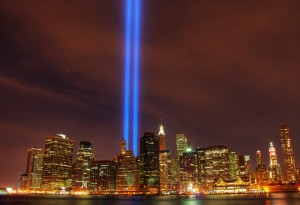I was among the many Americans who felt 9/11 indirectly – and yet, how indirect was it? My mother taught at school where a parent was killed in the attack. My high school English teacher’s friend from childhood was a firefighter who was killed. College friends had high school classmates whose parents were killed, or who could recount the smoke billowing over their homes. An innocent man was arrested in the Providence Amtrak Train station in a spasm of paranoia. I saw image after image appear on television screens, read commentary, wrote my own, and tried to make sense of what happened –where were we? Can we wake up?
I was a suburban American child of the 1990s, a decade, in certain ways, for certain Americans, of prosperity and growth. From malls to condominiums, from minivans to MTV, from the Gulf War to Kosovo, from Pat Buchanan to Britney Spears, from Macs to PCs, the 1990s brought with it an explosion of digital technology, an unmatched period of United States power, dreams, and lusts.
What country did I grow up in? Generally speaking -a wealthy one. A place where history had ended – where the great struggles involved fighting consumerism and moving beyond materialism. As a very young activist, I felt that my biggest challenge would be to try to do something for worker rights internationally – how could effects of international shopping be made equitable? How could the rights of workers in China, Mexico and the US be guaranteed?
9/11 shook me. Did we also have to now organize to stop wars? What about worker rights? What about immigration? I have not done enough for my original hope of fighting for workers rights. I’ve been active in education and local work, but 9/11 shook some of my intentions, and perhaps made education a bit more attractive, in the hopes that by promoting an education of history and diversity, less violence would happen in the future.
In many ways, the 1990s saw a continuation of the shiny promises of the “return to order” of Reaganism. Reagan promised an end to the cultural confusion of the 1960s and 1970s- he promised a strong America, a weak welfare state, and a stronger military. His order was based on undermining the social supports – Social Security, Unions, well-funded public universities and affordable higher education- that had produced the Great American Middle Class of the Post War period. Reagan and his cohort believed in the beauty and violence of disaster capitalism – the freedom to grow and collapse, rather the slow stability of well paid, well supported work and education to promote a broadly wealthy society. In exchange for that broad middle class, policies favored the pocketbooks of millionaires and billionaires (and the hopes and chance of becoming a millionaire) – and rhetoric grew of the unworthy or hopeless poor, the corrupt unions against the pure free market, the holy believers against the secular university. There was something comforting in the world of Reagan’s suburbs – but over the decades many suburban homes were paid for with unrealistic mortgages, many families had to work two jobs not out of choice but to maintain a semi-wealthy lifestyle, and many children were forgotten or left to play with toys.
9/11 was a shock to this American urban/suburban world I had grown up in. The America I had known- safe, secure, powerful , isolated– was scared. I remember my mother made me survival packs to take to school in case there was a terrorist attack. I remember an eerie feeling that people in my high school building, constructed in 1925, had experienced many disasters before – World War II, the murders of President John, Minister King, and Candidate Robert Kennedy, the saga of Vietnam, the Gulf War. All these conflicts had happened, and my high school was still there. People in the halls before me had lived and responded to disasters – and life went on. But it was still uncertain, and always changing.
In so many ways, isn’t our national story, our international story, linked to our daily lives? I’ve had classmates who are veterans of the Iraq and Afghan wars. I’ve had friends try to join the army, and worry for them has increased greatly because of the wars. I’ve attended protest rallies, lectures, and peace vigils, written letters to the editor, argued with friends and strangers, and tried to make sense of what is going on. I’ve been in an American school building closed because of physical neglect as billions of dollars are spent on war machines and drones. I was in New York City with my best friends the night the Time Square Bomber attempted his mayhem. I’ve written to friends in London following an attempted bombing in Piccadilly Circus. I’ve read poignant essays on continuing on despite the threat of terror, one of the most striking for me being on life in Bombay following a terrorist shooting rampage. My grandparents once visited Italy simultaneous to an airport bombing in Rome during the Years of Lead (when left and right wing terrorists killed dozens, if not hundreds, of everyday people in the pursuit of a cause). Even in hellish times, growth happens when people connect.
Even in pain, people can overcome when they connect. In thinking about the violence and the loss, some people use memories to build walls. Others to connect across barriers. What type of country we become, and the type of people we will be, in the next ten years and beyond, will be greatly shaped by us drawing inward or finding better ways to connect.


